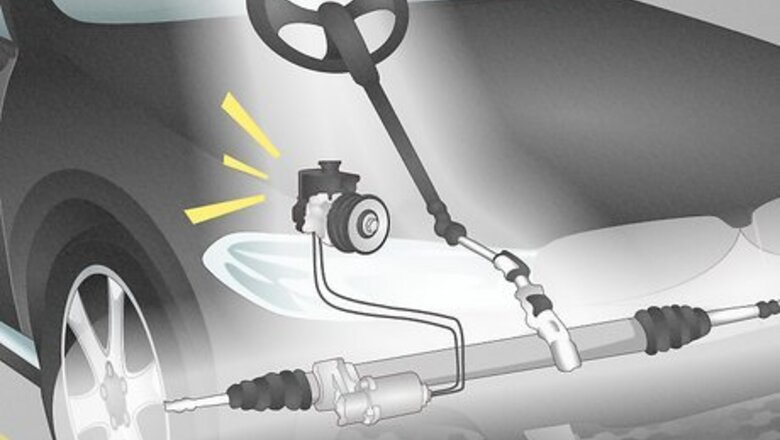
views
- If your vehicle whines while turning, the power steering system is malfunctioning or you’re low on power steering fluid.
- If the whining only appears when you accelerate, the transmission is likely damaged.
- Whining while the car is idling points toward an oil pressure issue. You may have a leak or simply be low on oil.
If your car whines when you turn…
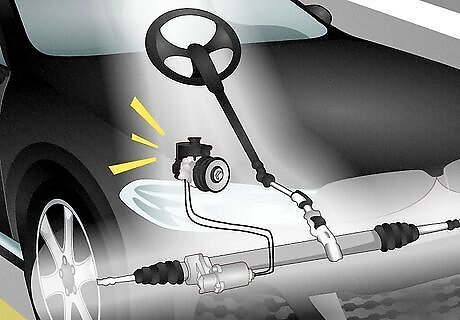
You probably have a problem with your power steering system. The power steering system ensures that the hydraulic lines connecting your steering wheel to the tires are pressurized. This makes it easy to turn the wheel and corner. But if the power steering pump has gone bad or you’ve got a power steering leak, your vehicle may make a whining noise as you turn. Other symptoms: Your steering wheel may feel harder to turn than it normally does. You may also notice your vehicle handling less smoothly than it used to. The fix: You either have a power steering leak that needs to get patched or a pump that needs to be replaced. In either case, see a mechanic to have the job assessed. The cost: Expect to spend around $200-400 if the power steering lines need to be patched and re-pressurized. If the pump is bad, it may cost $500-750.
If your car whines when you accelerate…
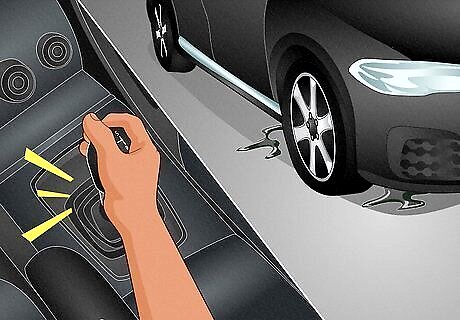
Your transmission is likely not operating correctly. The transmission is responsible for changing your vehicle’s gear as it converts your engine’s combustion into rotational power. If your transmission has worn out gears, the alternator bearings have gone bad, or you have a transmission fluid leak, the vehicle will whine as your transmission struggles to turn and convert the energy from the engine. Other symptoms: You may notice engine kickbacks, trouble getting up to speed, engine misfires, trouble shifting, or a burning aroma. The fix: See a transmission specialist. It really depends on which particular components in your transmission need to be repaired or replaced. In the worst-case scenario, your transmission may need to be rebuilt. The cost: Minor repairs are likely to cost around $800. Larger repairs or rebuilds average around $3,000.
If your car makes noise when you’re idling…
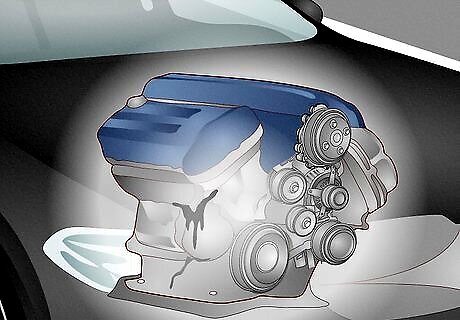
You’ve probably got an oil pressure problem. Oil flows through your engine to keep the gears and cylinders lubricated so that heat doesn’t build up. But if you have an oil leak or your oil levels are low, your engine may whine as you idle (parked or unparked). This happens because the idling engine is pumping oil at the lowest possible pressure, so the whining noise occurs wherever the oil isn’t reaching a component or gear. That friction creates noise. Other symptoms: You may get an oil pressure warning light. It’s possible you notice more vibration in your steering wheel than normal. The fix: Check your oil dipstick and look to see if your car is leaking. If there’s no leak, simply add oil. If there is a leak, see a mechanic to have the leak fixed. The cost: If your oil is simply low, it’ll just cost you a bottle of oil (around $15-30). A leak repair may cost you $150-250.
If your car makes noise while idling that gets louder when accelerating…
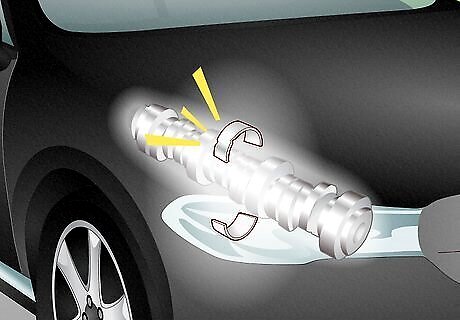
One of the bearings in your crankshaft is on the verge of failure. Do not drive your vehicle if you hear whining while you’re idling and the noise gets louder when you depress the gas pedal. This is likely one of the two bearings at either end of the crankshaft. This can happen if the oil has been dangerously low for a low time, or if the engine is simply nearing the end of its life. Other symptoms: Your low oil pressure indicator is likely going to come on if the oil is low. If the crankshaft is to blame, you may get a check engine light. The fix: If this is simply an oil issue, replace the engine oil. You may need to get a mechanic to fix a leak if you have one. If the crankshaft bearings are bad, they need to be replaced—although it’s normally not worth it if the car is very old. The cost: Simple oil issues may only run $100-250. The crankshaft is a more serious condition. A new bearing can run over $2,500, so if the car is on the older side it probably isn’t worth the cost.
If your car makes noise when you’re braking…
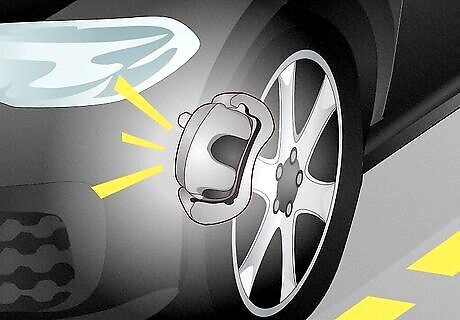
This is a sign it’s time to get new brake pads. Modern brake pads are designed to make a whining noise when they’re getting close to the end of their service life. So, if you hear a whining noise when you brake, see a mechanic to get some new brake pads installed. Other symptoms: None. This is perfectly normal. The fix: Get your brakes serviced. The cost: Expect to spend $100-300 per axle.
If your car makes noise when you start it…
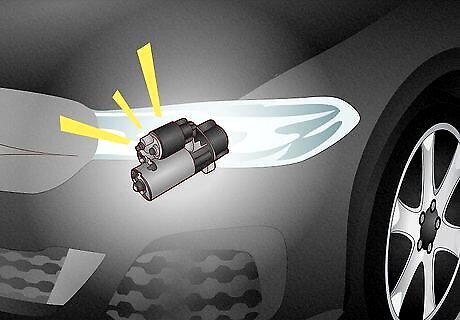
Your starter or serpentine belt may need service. If the whining only occurs when you’re cranking the engine, your starter is likely nearing the end of its life and it’s time for a replacement. If the whining persists after you crank the engine but goes away after a few seconds, your drive belt is probably a little worn down and it needs to be replaced. Other symptoms: None, normally. You might notice some inconsistent RPM readings if your drive belt slips while you’re driving. The fix: Either replace the starter or replace the drive belt. The cost: A new starter will only run $80-100. If the car is on the newer side, it might be $350. The serpentine belt should cost about $100-200.
Other Potential Causes
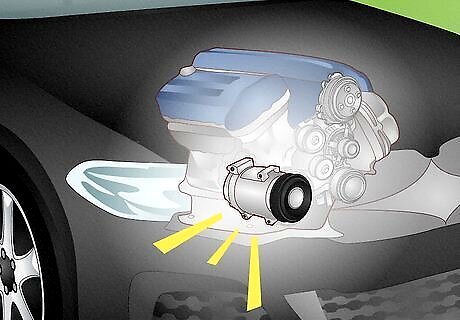
Bad AC compressor The AC compressor is responsible for pressurizing the air that comes out of your vents when you turn the air conditioning on. By squeezing the refrigerant against the air, it cools that air to keep you comfy while you drive. If the compressor goes bad though, it may make a whining noise when air flows through it and it struggles to perform its job. Other symptoms: The air coming out of your vents isn’t as cold as you think it should be (or it’s not cold at all). The whining will also get louder when you turn the AC on. The fix: You need a new air compressor for your AC system, so see a mechanic to have it installed. The cost: This one really depends on how hard the AC compressor is to reach for your make and model. On the low end it may be $500, but if it’s a complicated job it can run up to $1,500.
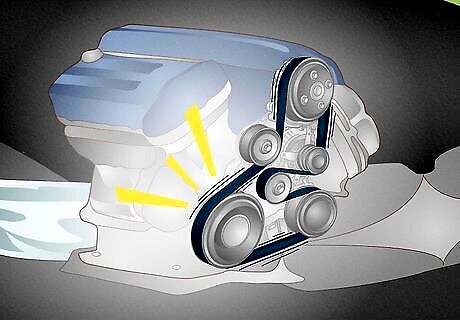
Loose or worn drive belt The drive belt, also known as a serpentine belt, loops around multiple gears and pulleys on your engine to ensure everything works in tandem at the proper rotational speed. If the belt is loose or worn down though, it can make a whining noise when your car is running. Other symptoms: Your engine performance is worse than it normally is, you have a harder time moving the steering wheel, your engine runs hot, or you experience engine misfires. The fix: See a mechanic. The serpentine belt either needs to be tightened and re-calibrated, or it needs to be replaced entirely. The cost: Minor adjustments may only cost $50-150. If you need a new belt it may be an additional $100 or so.
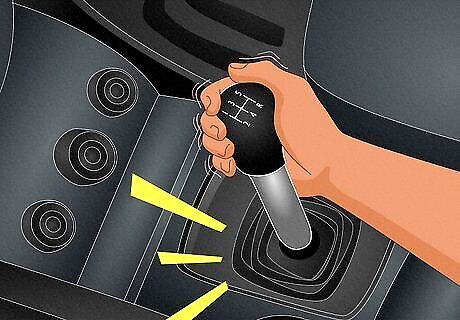
Worn clutch (manual only) If you drive a manual vehicle, a worn down clutch may whine when you try to shift gears. The clutch is responsible for shifting the transmission’s position, but if it’s damaged or worn down, it may whine whenever you shift or depress the pedal. It’s also possible that this noise is caused by a loose clutch bearing that’s rubbing against something it shouldn’t be. Other symptoms: Your clutch pedal feels sticky or “soft,” the engine revs just fine but your acceleration feels off, or your gears slip. The fix: See a professional with experience working on manual transmissions. The fix here will vary depending on the specific issue. The cost: It depends on your model and the nature of your problem. Replacing a single bearing may only run $100-200, but more complex issues may run up to $2,000.


















Comments
0 comment